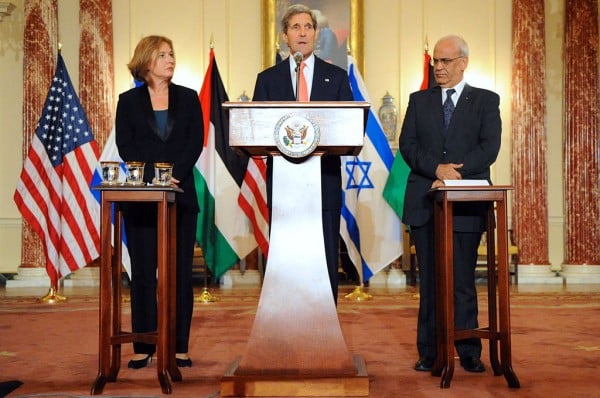
Starting with the Palestinian Authority President Mahmoud Abbas’s signing of 15 international conventions, the dramatic events over the past week indicate that Israeli-Palestinian peace talks have reached yet another impasse.
Several officials on U.S. Secretary of State John Kerry’s senior staff and inside the White House believe “it’s time to say enough.” According to them, Kerry’s focus on the Israeli-Palestinian peace process poses a risk of “looking desperate,” while other international issues are sidelined.
“A point will come where he has to go out and own the failure,” an official told the Washington Post. For now, the official said, Kerry needs to “lower the volume and see how things unfold.”
Speaking earlier Thursday during a visit to Algeria, Kerry said now is a “critical moment” for talks and that, “You can facilitate, you can push, you can nudge, but the parties themselves have to make fundamental decisions and compromises.”
In what might be a preemptive move by the Palestinian leadership, a list of demands presented to the Palestinian Leadership Organization by Chief Palestinian Negotiator Saeb Erekat and Mohammed Al-Aulul, a Fatah central committee member, was leaked to the press. Major items on the list include the release of 1,200 Palestinian prisoners and that East Jerusalem be made the capital of a Palestinian State along the1967 borders.
Also on Thursday, Tzipi Livni’s spokeswoman said that the government was working to finalize an agreement to free the prisoners when Abbas signed letters of accessions to 15 international conventions. Livni said the prisoner release was contingent on the Palestinians refraining from making unilateral moves and now that “new conditions were established, Israel cannot release the fourth batch of prisoners.”
Following a seven-hour meeting between Livni, Erekat, and U.S. Middle East envoy Martin Indyk, which the Palestinian news agency Ma’an described as a “fierce political battle,” Livni called on the Palestinians to retract their move and return to negotiations. Ma’an quoted Palestinian sources as describing the meeting as “long and heated,” and saying it “ended without any signs of bringing both sides back to the negotiating table.” According to the report, Indyk, who arranged the meeting, struggled “to control heated exchanges between both sides.”
The two sides have until the April 29 deadline to overcome these obstacles and decide whether or not to move the peace talks forward. As for Kerry’s future involvement, he has proven time after time to be steadfast and unyielding to negativity.
Deputy National Security Advisor Ben Rhodes told the Washington Post that “there is no limit to the need to work with the Israelis and the Palestinians on this set of issues” and while there is an inevitable question of “whether he is able to do this and the other things on his plate,” Rhodes said, “thus far, in part because of his seemingly endless reservoir of energy and frequent-flier miles,” Kerry has pulled it off.